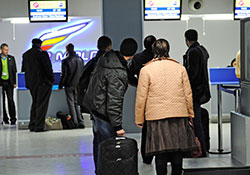Ana*, former nurse from the Republic of Moldova, now working as a carer in Italy

WHO
My salary as a nurse in the Republic of Moldova was not enough to support my family, and it didn’t take me long to make up my mind about what needed to be done. In the beginning I was not sure for how long I was going to be gone. I didn’t know what to do with my nursing job at that time, so I took an annual leave. Later, when I missed more than half a year of work, I resigned from my nursing position in the Republic of Moldova. I know it is very difficult to get employed again in the system, but I didn’t feel as though I had any other choice.
I also knew that there was no one waiting for me abroad, nor was there any guarantee that I would find a job. I went to Europe with a 10-day tourist visa, having paid Euro 4000 for a European tour. Although the ‘organizers’ promised to take me to Italy, I was abandoned in a small town in Germany. I was afraid of the police, and I did not know anything except a few words in Italian. Luckily, I managed to reach my acquaintances from Italy on the telephone and was able to make my way there.
It has been seven years since I settled in Treviso, Italy. My husband, who is a veterinarian, and my children did not want to leave the Republic of Moldova to join me. The money I earned in Italy and sent home was used to repair the house and to help my children - my son graduated from university and took an internship at a transportation company, and my daughter is in her last year of high school.
During all these years I changed jobs a lot, saving each Euro to pay my debt and help my family. In the beginning I worked at a local brush factory. I worked as a cleaning lady in households and organizations. I worked in hotel service, as well. All the jobs were illegal. I got legal status three years ago when an Italian family hired me to take care of their paralyzed mother. I am deeply grateful to them for having given me safety, first of all. I have repeatedly heard from my colleagues here about different refresher and advanced training courses and that the Italian system needs qualified nurses. Of course, if I take these courses, and if I am employed at a medical facility in Italy, it would automatically mean a totally different salary and different working conditions. Still, I am thinking of going back home... I have spent too many years away from my family.”
* Name has been changed to protect interviewee’s privacy.
Migration from the Republic of Moldova
Migration, in most cases undertaken illegally, has heavily affected this small country. Ana is one of thousands of Moldovans who have moved abroad for work. In so doing, many of these migrants are no longer able to utilize their professional skills, contributing to brain waste and brain drain – phenomena that have a harmful impact on both the individual who is underutilized as well as the origin country, which experiences a detrimental loss of vitally skilled and trained labour.
In the past 20 years, more than 40% of health professionals from the Republic of Moldova have left the national health system, and a great number of them have migrated abroad. However, most of them do not work as doctors or nurses in destination countries; instead, they are employed in other areas that do not require higher education or specialized qualifications. At the same time, medical licensing is a complex and long-term process, which differs from one country to another. Diploma equivalents depend on the health system of a certain country, its regulations and licensing systems.
Additionally, reintegration into the Moldovan health care system is a long and complicated process that requires advanced training courses, as well as the financial and logistical means to relocate.
What WHO/Europe is doing
To support the Republic of Moldova in improving the management of health professional mobility, WHO/Europe, the WHO Country Office in the Republic of Moldova and the European Union launched the project "Better Managing the Mobility of Health Professionals in the Republic of Moldova".
This project aims to:
- promote legal and circular migration;
- mitigate negative effects of brain drain and brain waste;
- facilitate the reintegration of healthcare professionals returning home into the national health system;
- strengthen the national evidence base on monitoring the migration of health professionals; and
- support the Ministry of Health in developing retention mechanisms and incentives for doctors and nurses.
We would like to hear from others with stories similar to Ana’s. Please contact the WHO Country Office in the Republic of Moldova to share your experiences.



